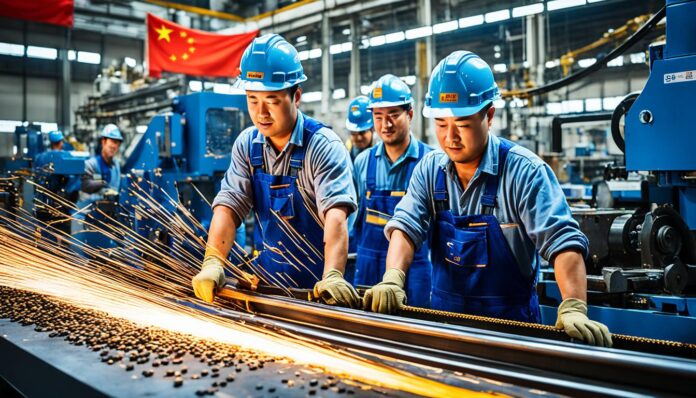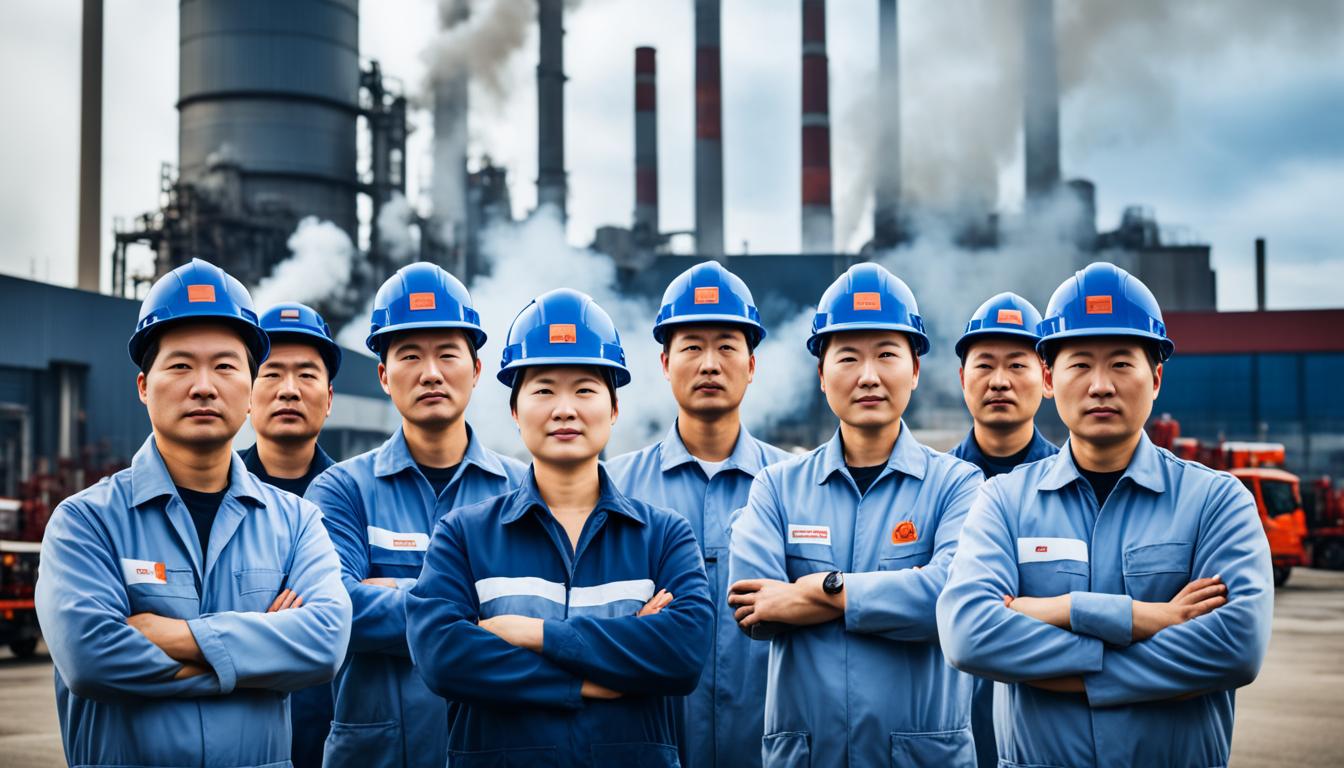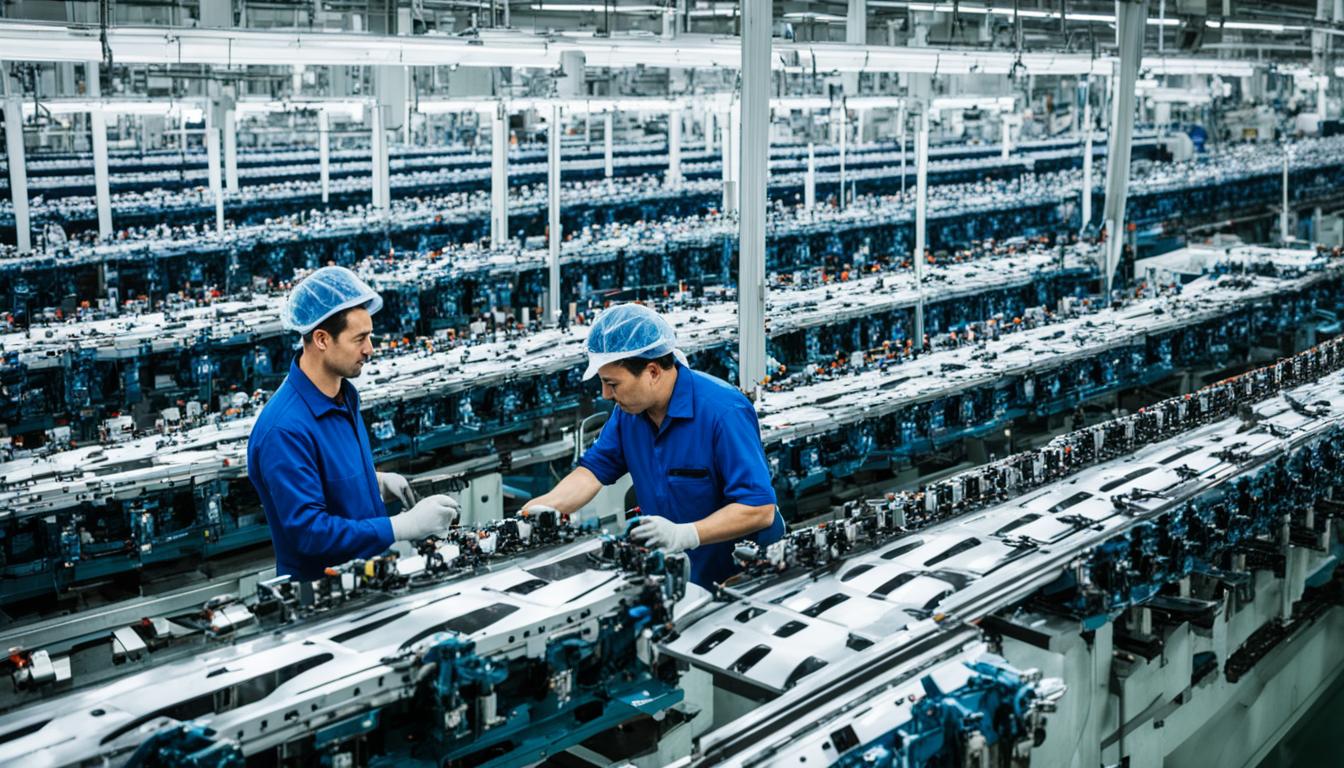
In the heart of Europe, Germany’s manufacturing and automotive sectors are admired globally. A key part of this success is due to Chinese workers. They are driving a big change in these industries. This shift is part of China’s “Made in China 2025” (MIC2025) plan, aiming to compete with Germany’s quality.
This strategic move is shaping Germany’s future economy. It’s changing the way we see global work. This transformation is not just affecting German industries, but the whole world.
Key Takeaways
- China’s MIC2025 initiative targets Germany as a source of advanced technology and a partner to proliferate Chinese standards.
- German manufacturing and automotive industries are a key focus of China’s strategy to “leapfrog” the world’s developed countries.
- German firms are increasingly relying on Chinese workers to power their operations, both in their own plants and throughout the supply chain.
- The influx of Chinese labor is contributing to job losses in key German industries as production and investment shift to China.
- The once-close economic relationship between Germany and China is starting to shift, with China emerging as a formidable competitor in industries Germany once dominated.
Introduction to Made in China 2025 Initiative
In 2015, China launched “Made in China 2025” (MIC2025). This is a big strategy to make China a top manufacturing great power. It is part of a 30-year plan to help China lead the global technological and economic front.
Beijing’s Ambition for Global Manufacturing Dominance
MIC2025 aims for China to lead in global manufacturing. They want to win the “new industrial revolution.” This includes fields like advanced tech, robotics, electric vehicles, and high-quality medical gear.
China’s Strategic Approach: Leverage Foreign Partnerships
China’s approach is unique. They focus on working with international companies and governments. This way, China can bring in new technology. It also helps them set the rules and standards in global manufacturing for the long run.
Germany: A Critical Tool for Technology Acquisition
The report shows that China aims to target Germany through three key ways under its “Made in China 2025” plan. It sees Germany as a rich source of advanced technology, a partner to export standards that benefit China, and a competitor in technology. This strategy highlights Germany’s key role in China’s goals to be a world leader in manufacturing.
Targeting German Automotive and Manufacturing Sectors
China sets its eyes on what Germany does best, such as the automotive, machinery, chemical, medicine, and electronics sectors, including new energy and environmental technologies. These areas play a vital part in Germany’s economy and its technological edge.
China also looks at sectors where Germany helps set global standards, like in banking, new energy vehicles, and energy.
Joint Ventures and Forced Technology Transfers
Beijing provides subsidies and state support to get Chinese companies to acquire foreign technology. This includes using joint ventures and forced technology transfers. Such tactics are how China obtains crucial technology and expertise from German businesses. This way, China can export and influence networks, standards, and platforms, strengthening its global position.
Germany: A Partner for Proliferating Chinese Standards
China is pushing its strategies through the “Made in China 2025” plan. They are not only looking to gain advanced technology from Germany. They also aim to set the standards for the “Industrial Internet of Things.”
They want to influence the way things are made and moved worldwide. This includes how factories run, supply chains operate, and how we manage logistics in the future.
Chinese companies are heavily investing in places like Germany. They’re focusing on creating industrial zones and improving things like telecommunications. They’re not just looking at making quick money. They’re building a strong foundation to control important parts of future global manufacturing and trade.
For China, partnering with Germany is vital. It helps China spread its standards and rules worldwide. These rules will guide the way industries and digital technologies develop in the 21st century.
Germany: How Chinese Workers Power Manufacturing and Automotive Industries
In Germany, relying on Chinese workers is more evident in manufacturing and autos. Chinese workers support German companies to meet President Xi’s vision for China’s auto industry. German firms use these workers both in Germany and across their supply chains worldwide.
Reliance on Chinese Labor in German Auto Plants
Top car brands like BYD, General Motors, and Volkswagen have factories in China. This has made German automakers depend more on Chinese workers in German auto plants. It helps them stay strong in the world’s car market.
Chinese Workers in German Supply Chain Operations
Chinese labor is now key in German supply chains. Germans are using skilled Chinese workers at affordable rates for their production and movement of goods. This shift is affecting jobs in Germany, with more production and investments moving to China.

| Key Findings | Data |
|---|---|
| Reliance on Chinese labor in German auto plants | Many global car brands like BYD, GM, Toyota, and VW have set up in China, pushing German automakers to use more Chinese workers in their German facilities. |
| Integration of Chinese workers in German supply chain operations | German firms are employing a large number of skilled and reasonable Chinese workers. This move is leading to job cuts in Germany as focus shifts to more production and investment in China. |
Germany: A Competitor in the Fourth Industrial Revolution
Today, the world economy is stepping into the “fourth industrial revolution.” This new era, called “Industry 4.0,” sees Germany facing off with China. They’re both aiming for the top spot in new tech and making things. A report by the Foundation for Defense of Democracies points out that China’s “Made in China 2025” plan views Germany as a major rival.
Race for Dominance in Electric Vehicles and Batteries
Germany and China are fiercely competing in the electric vehicles and batteries field. Chinese companies like BYD and CATL are racing ahead. They’ve topped Germany in cars, thanks to heavy state support. Now, they’re the leaders in electric vehicles and batteries.
Rivalry in Machinery and Advanced Manufacturing
In machinery and advanced manufacturing, China’s eyeing Germany’s lead. With its MIC2025 plan, China is aiming to beat Germany. This push is forcing German companies to stay ahead in robotics, automation, and software. Chinese firms are catching up fast with big investments.
| Metric | Germany | China |
|---|---|---|
| Electric Vehicle Production (2022) | 1.2 million units | 5.7 million units |
| Battery Manufacturing Capacity (2022) | 150 GWh | 400 GWh |
| Robotics and Automation Market Share (2022) | 35% | 25% |
Implications for the German Economy
China’s growing strength is starting to affect Germany’s economy. Decline in German exports to China and the erosion of German firms’ market share in China are key issues. These challenges are big for Germany.
Declining Exports and Eroding Market Share
The third source explains trends that suggest a fall in German exports to China. Changes in market competition and China’s local production policies are key reasons. This change might lower the need for German-made products in China. It could impact jobs in Germany that rely on export to China.
Additionally, German companies are facing more competition in China. Local Chinese businesses are beginning to cut into their market share and profit margins. This competition threatens the idea that Chinese profits support jobs and innovation in Germany.
Job Losses in Key German Industries
These adjustments are causing problems in Germany. Some have cut thousands of jobs, including companies like ZF Friedrichshafen, BASF, and Volkswagen. These changes are challenging the traditional strengths of German industry and automotive sectors.

Geopolitical Tensions and Shifting Dynamics
Germany’s once-strong economic tie with China is changing. China is now a big competitor, especially in areas that Germany was leading. Some in Germany, like companies and politicians, are not happy. They want to do less business with China, so they’re looking for new ways to grow their economy. The bad feelings are clear, with geopolitical tensions between Germany and China getting stronger by the day.
Pressures for Economic Diversification Away from China
In July 2023, the German government talked about doing less business with China. They want to broaden their trade to avoid depending too much on China. As China gets stronger in business, it’s tough for Germany to find other markets and suppliers.
Calls for Robust Industrial Policies and Protectionism
Europe is also looking at new policies to keep up with China. They want to protect jobs and industries in countries like Germany. People there say they need more rules to keep their manufacturing and technology safe. They feel like China is using unfair ways to compete.
This change could affect Germany’s industrial future and its global standing. As they try to find a new path, it will change Europe and the world’s economy and politics for a long time.
Conclusion
A report found that China is making big moves in Germany faster because of COVID-19. It’s likely their actions will increase even more after the pandemic. The Chinese Communist Party is using this time to take over key assets, increase its market share, and exploit Germany’s economic weaknesses.
This move is not only a problem for Germany, but also for the United States and their friends. The report says both countries need to come up with plans against China’s bold strategies in technology, setting standards, and competing in industry.
The report highlights the huge risks involved. China’s actions could change the world’s economy and politics on a large scale. So, leaders in Germany and the U.S. must join forces. They need to create strong plans to tackle these dangers and protect their countries’ interests.
FAQ
What is the "Made in China 2025" (MIC2025) initiative?
“Made in China 2025” (MIC2025) is China’s 2015 plan to boost its manufacturing strength worldwide. It aims to lead in global manufacturing by 2049. Part of a 30-year strategy, it focuses on sending Chinese businesses out into the world.
How does China use partnerships with foreign companies, governments, and institutions to acquire technology?
Instead of direct competition, China forms partnerships to get hold of technology. This strategy helps China push its own networks, standards, and platforms globally. Such actions give China long-term advantages.
Why does the MIC2025 initiative target Germany?
MIC2025 aims at Germany for its technology and as a competitive partner. China is interested in German expertise in several sectors. It views Germany as a global competitor in industries such as automotive, machinery, and electronics.
How is China using Germany to proliferate its standards?
China is keen on acquiring and influencing global standards. It supports building key infrastructure to spread its standards globally. Chinese efforts include creating industrial zones and info networks that prioritize its rules.
How are Chinese workers powering manufacturing and automotive industries in Germany?
Chinese workers are becoming key in German manufacturing and car sectors. They work in German plants and throughout the supply chain. This reliance leads to job losses in Germany as work moves to China.
How is China competing with Germany in the fourth industrial revolution?
China rivals Germany in new areas like electric cars and manufacturing. Companies like BYD and CATL lead in making electric cars. This success threatens Germany’s hold in these sectors.
What are the implications of China’s actions for the German economy?
German exports to China are facing challenges because of China’s policies. German firms are also shifting some production to China. This could weaken German manufacturing jobs that rely on Chinese demand.
How are German companies and politicians responding to the changing dynamics?
The relationship between Germany and China is changing. China is now seen as a strong rival. This shift is leading some in Germany to look for new markets. They want stronger trade policies in the EU.
